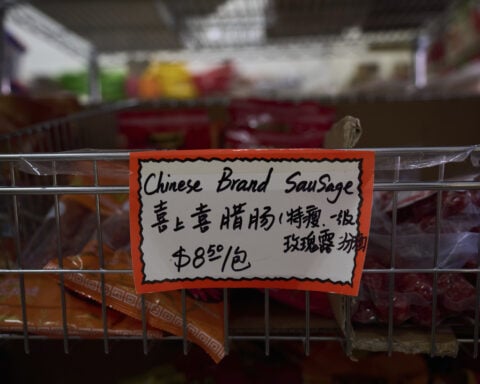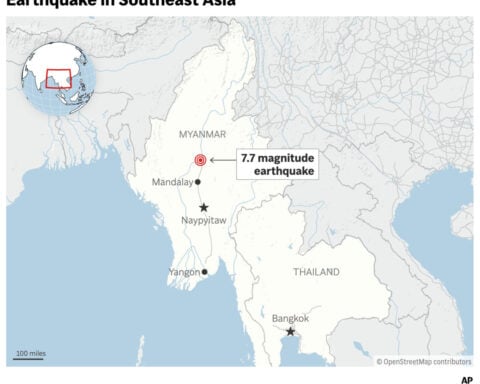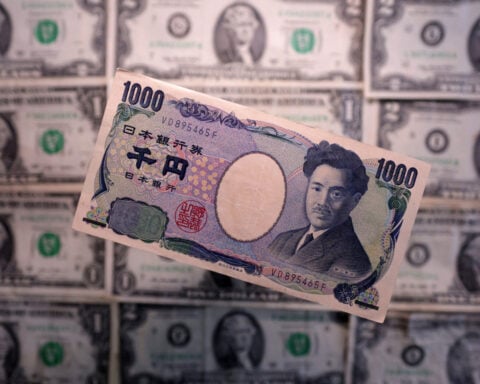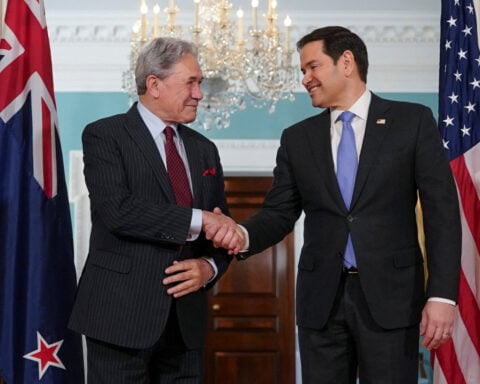By Caroline Valetkevitch
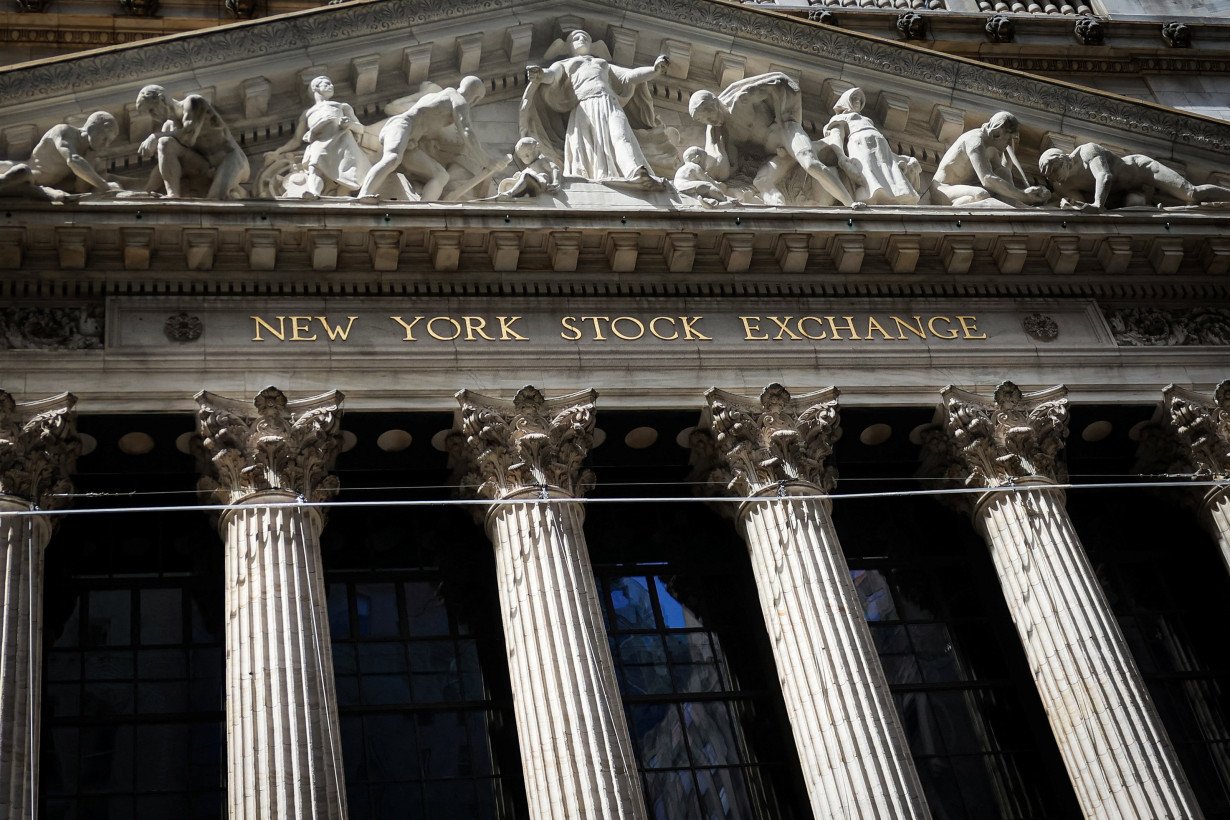
NEW YORK (Reuters) - Major stock indexes fell on Tuesday as the trade war between the United States and China intensified, while oil prices and the U.S. dollar also eased.
The United States said 104% duties on imports from China will take effect shortly after midnight. The news drove up concerns about slowing growth and higher inflation that have pummelled stocks since last week.
S&P 500 companies have lost $5.8 trillion in stock market value since U.S. President Donald Trump's tariff announcement late last Wednesday, the deepest four-day loss since the benchmark was created in the 1950s, according to LSEG data.
The U.S. Treasury yield curve reached its steepest level since February 2022 on Tuesday as longer-dated yields jumped on supply concerns.
On Wall Street, the S&P 500 closed below 5,000 for the first time in almost a year. Stocks had been sharply higher early in the day amid investor optimism that Washington might be willing to negotiate on some of its aggressive tariffs.
"People wanted to be optimistic and eventually realized they didn't have a good reason," said Melissa Brown, managing director, investment decision research, at SimCorp.
The Cboe Volatility index climbed for a fourth straight session and had its highest closing level since April 1, 2020.
The Trump administration also is negotiating trade agreements with countries, including Japan, and Treasury Secretary Scott Bessent said the discussions are the result of multiple calls from other countries.
The Dow Jones Industrial Average fell 320.01 points, or 0.84%, to 37,645.59, the S&P 500 fell 79.48 points, or 1.57%, to 4,982.77 and the Nasdaq Composite fell 335.35 points, or 2.15%, to 15,267.91.
MSCI's gauge of stocks across the globe fell 2.52 points, or 0.34%, to 742.96. The pan-European STOXX 600 index rose 2.72%.
Investors are looking ahead to the start of U.S. quarterly earnings reports this week.
Adam Sarhan, chief executive of 50 Park Investments in New York, said upbeat results could potentially be a catalyst to support stocks.
JPMorgan Chase, Citigroup and Wells Fargo will kick off results on Friday. JPMorgan's CEO Jamie Dimon has warned that trade wars could have lasting negative consequences, including inflation and recession.
In Treasuries, the curve between two- and 10-year note yields steepened sharply to 57 basis points, as the two maturities moved in opposite directions on a volatile day of trading.
The benchmark 10-year yield rose to an 11-day high on worries about weak demand for longer-dated U.S. government debt before a sale of the notes on Wednesday.
The 10-year note yield was last up 12.6 basis points on the day at 4.283%. It fell to 3.86% on Friday, the lowest since October 4.
The interest-rate sensitive two-year yield reversed an earlier increase and fell 2.3 basis points to 3.715%. It had reached 3.435% on Monday, the lowest since September 2022.
The euro gained following reports that German political parties had agreed to form a coalition, while the U.S. dollar weakened against major currencies and China's offshore yuan hit a record low. European equity index futures also rose after the reports.
Germany's conservatives under chancellor-in-waiting Friedrich Merz on Tuesday reached a deal with the centre-left Social Democrats (SPD) to form a government, NTV reported. But two people with knowledge of the matter denied to Reuters that a deal has been reached.
The dollar, which has taken a beating from the tariff turmoil, remained weak against other major currencies.
The dollar index, which measures the greenback against a basket of currencies including the yen and the euro, fell 0.48% to 102.92.
Oil prices ended lower amid the recession worries as the U.S.-China trade war escalated.
Brent futures fell $1.39, or 2.16%, to settle at $62.82 a barrel. U.S. West Texas Intermediate crude futures settled down $1.12, or 1.85%, at $59.58.
(Reporting by Caroline Valetkevitch in New York; additional reporting by Noel Randewich in San Francisco; Editing by Peter Graff, Nick Zieminski, Joe Bavier and Deepa Babington)

 Trump has begun another trade war. Here's a timeline of how we got here
Trump has begun another trade war. Here's a timeline of how we got here
 Canada's leader laments lost friendship with US in town that sheltered stranded Americans after 9/11
Canada's leader laments lost friendship with US in town that sheltered stranded Americans after 9/11
 Chinese EV giant BYD's fourth-quarter profit leaps 73%
Chinese EV giant BYD's fourth-quarter profit leaps 73%
 You're an American in another land? Prepare to talk about the why and how of Trump 2.0
You're an American in another land? Prepare to talk about the why and how of Trump 2.0
 Chalk talk: Star power, top teams and No. 5 seeds headline the women's March Madness Sweet 16
Chalk talk: Star power, top teams and No. 5 seeds headline the women's March Madness Sweet 16
 Purdue returns to Sweet 16 with 76-62 win over McNeese in March Madness
Purdue returns to Sweet 16 with 76-62 win over McNeese in March Madness
